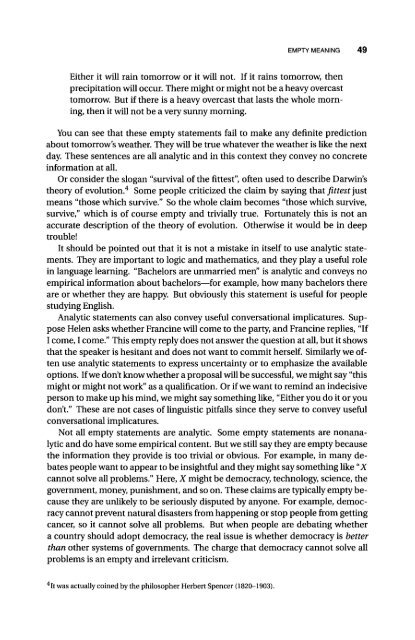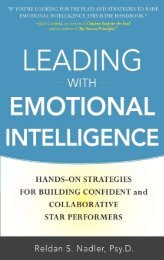An Introduction to Critical Thinking and Creativity - always yours
An Introduction to Critical Thinking and Creativity - always yours
An Introduction to Critical Thinking and Creativity - always yours
You also want an ePaper? Increase the reach of your titles
YUMPU automatically turns print PDFs into web optimized ePapers that Google loves.
EMPTY MEANING 49<br />
Either it will rain <strong>to</strong>morrow or it will not. If it rains <strong>to</strong>morrow, then<br />
precipitation will occur. There might or might not be a heavy overcast<br />
<strong>to</strong>morrow. But if there is a heavy overcast that lasts the whole morning,<br />
then it will not be a very sunny morning.<br />
You can see that these empty statements fail <strong>to</strong> make any definite prediction<br />
about <strong>to</strong>morrow's weather. They will be true whatever the weather is like the next<br />
day. These sentences are all analytic <strong>and</strong> in this context they convey no concrete<br />
information at all.<br />
Or consider the slogan "survival of the fittest", often used <strong>to</strong> describe Darwin's<br />
theory of evolution. 4 Some people criticized the claim by saying that fittest just<br />
means "those which survive." So the whole claim becomes "those which survive,<br />
survive," which is of course empty <strong>and</strong> trivially true. Fortunately this is not an<br />
accurate description of the theory of evolution. Otherwise it would be in deep<br />
trouble!<br />
It should be pointed out that it is not a mistake in itself <strong>to</strong> use analytic statements.<br />
They are important <strong>to</strong> logic <strong>and</strong> mathematics, <strong>and</strong> they play a useful role<br />
in language learning. "Bachelors are unmarried men" is analytic <strong>and</strong> conveys no<br />
empirical information about bachelors—for example, how many bachelors there<br />
are or whether they are happy. But obviously this statement is useful for people<br />
studying English.<br />
<strong>An</strong>alytic statements can also convey useful conversational implicatures. Suppose<br />
Helen asks whether Francine will come <strong>to</strong> the party, <strong>and</strong> Francine replies, "If<br />
I come, I come." This empty reply does not answer the question at all, but it shows<br />
that the speaker is hesitant <strong>and</strong> does not want <strong>to</strong> commit herself. Similarly we often<br />
use analytic statements <strong>to</strong> express uncertainty or <strong>to</strong> emphasize the available<br />
options. If we don't know whether a proposal will be successful, we might say "this<br />
might or might not work" as a qualification. Or if we want <strong>to</strong> remind an indecisive<br />
person <strong>to</strong> make up his mind, we might say something like, "Either you do it or you<br />
don't." These are not cases of linguistic pitfalls since they serve <strong>to</strong> convey useful<br />
conversational implicatures.<br />
Not all empty statements are analytic. Some empty statements are nonanalytic<br />
<strong>and</strong> do have some empirical content. But we still say they are empty because<br />
the information they provide is <strong>to</strong>o trivial or obvious. For example, in many debates<br />
people want <strong>to</strong> appear <strong>to</strong> be insightful <strong>and</strong> they might say something like "X<br />
cannot solve all problems." Here, X might be democracy, technology, science, the<br />
government, money, punishment, <strong>and</strong> so on. These claims are typically empty because<br />
they are unlikely <strong>to</strong> be seriously disputed by anyone. For example, democracy<br />
cannot prevent natural disasters from happening or s<strong>to</strong>p people from getting<br />
cancer, so it cannot solve all problems. But when people are debating whether<br />
a country should adopt democracy, the real issue is whether democracy is better<br />
than other systems of governments. The charge that democracy cannot solve all<br />
problems is an empty <strong>and</strong> irrelevant criticism.<br />
4 It was actually coined by the philosopher Herbert Spencer (1820-1903).
















